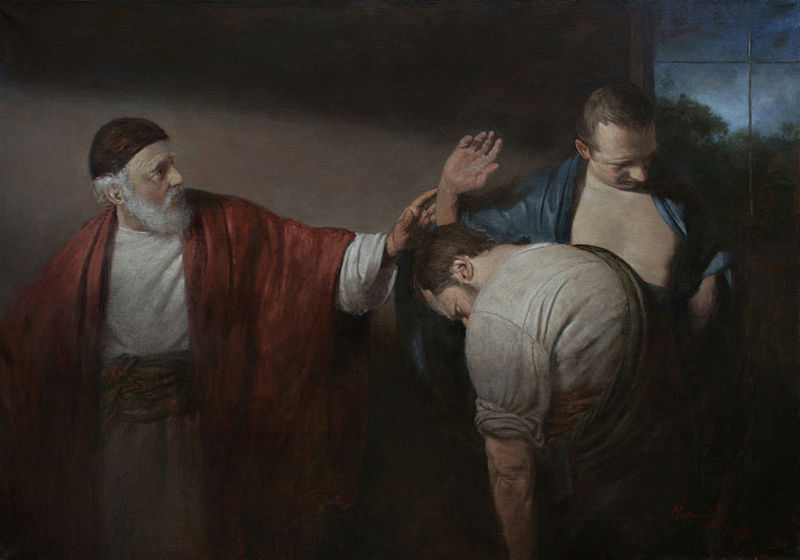 Every Saint has a past, Every Sinner a future
Every Saint has a past, Every Sinner a future
Remember when we were young, many of us played the silly game of ‘police-and-robbers' (another variation of this game would be ‘cowboys-and-Indians’, before it got cancelled by political correctness). Everyone knew that the police were the good guys and the robbers were the bad guys. Police were meant to catch robbers and put them in gaol and everyone would applaud their deeds – with criminals behind bars, our homes and streets are safe again.
Well, this seems to be the prevalent view until recently. The Defund-the-Police movement in America has reversed our evaluation of their roles. The police are now considered the bad guys and the criminals who loot, who rape, who push drugs, who commit acts of violence are now hailed as the heroes; in fact, they are canonised in some sick parody of the religion of the “woke.” But this is just another facet of popular culture, who for decades had tried to rewrite history in schools, literature, movies and even religion by canonising the villains and vilifying its heroes and saints.
Is that what we are seeing in today’s readings? On the contrary, the readings actually challenge this increasingly popular skewed world-view. Jesus is not congratulating and applauding the sinners because of their sin. He’s applauding their readiness to heed His life-changing message, and in response to that message, repent and change, to turn away from their sin, and correct the mistakes of the past. He is not applauding the “bad guys” for being “bad guys.” He’s applauding them for choosing to turn their lives around and become the “good guys.”
In one of the celebrated homosexual playwright Oscar Wilde’s play, “A Woman of No Importance,” the hedonistic character Lord Illingworth (perhaps an echo of Oscar Wilde’s own wild life of debauchery) says, “every Saint has a past and every sinner a future.”
The meaning is simple and edifying: No one is so good that he hasn’t failed at some point, and no one is so bad that he cannot be saved. All have sinned, and all can be saved by God’s grace. The only distinction is between those who have already received it and those to whom it is still available. God’s grace is readily available for the taking. We just have to embrace it.
This is what happened in the parable of the two sons - the first son was initially unwilling but later changed his mind and did his father’s bidding; the second son who promised that he would do it without hesitation, turned out to be a disappointment. He did not keep his promise, and his words proved to be empty. Remember that talk is cheap but actions speak louder than words. As Benjamin Franklin noted “well done is better than well said.”
Although this parable seeks to make a contrast between the two sons, just like the parable of the Prodigal Son in St Luke’s gospel, we should also pay attention to the father’s words and actions. The father’s instruction to his sons is an imperative command, “go”, with some translations saying, “go down.” “Go down” is a cue word for the Incarnation. In obedience to the Father’s command to “go down” and for us and for our salvation, the Word leapt down from heaven. Indeed, our Lord Jesus Christ is the Son who dutifully obeyed His Father’s command to “go down” to the vineyard of humanity, as St Paul tells us in the second reading - He is the one who “emptied Himself (of his divinity) ... and accepting death, death on a cross.” Unlike the first son in the parable who initially refused to “go” or the second son who said “yes, I will go” but did not keep his promise, our Lord did not refuse the Father’s commission, neither did He renege on His promise.
It is true that none of us may be able to come close to the impeccable example of Christ. It is more likely that our answer to God’s call is “no”, rather than “yes, I will go.” But there is hope. Remember: every Saint has a past and every sinner can have a future. We may say “no” today or maybe even tomorrow. But one day, we may finally come round to acknowledge our mistakes, amend our ways, and say “yes.” As the prophet Ezekiel in the first reading assures us, “when the sinner renounces sin to become law-abiding and honest, he deserves to live. He has chosen to renounce all his previous sins; he shall certainly live; he shall not die.’ For every person is not disqualified nor is he disadvantaged by his past, no matter how sordid or ugly it may be. But a man’s fate can and will be defined by how he chooses to end the story of his life.
On his death bed, Wilde was baptised into the Roman Catholic Church and received Last Rites. Is it possible that a sinner with a horribly sordid past ends up in the company of the Blessed Virgin Mary, angels and saints in heaven? We are reassured today that it is possible. It is possible that the sinner with a dark past can become a saint and gain eternal life. Just like the game of police-and-robbers, the roles can be reversed. Today, you may be in the role of the “bad guy,” but tomorrow you have the opportunity to play the “good guy.” It would also be important to remember that we should not remain complacent, just because we see ourselves today as the “good guy.” Tomorrow, we may end up as the “bad guy.” For those who have chosen to do the will of the Father, let us remain faithful to our commitment. For those who had rejected the will of the Father, He gives us the opportunity to repent. For anyone who chooses to renounce all his previous sins; he shall certainly live, he shall not die. That is our hope for every person, for every sinner and for everyone struggling to do the will of the Father.

